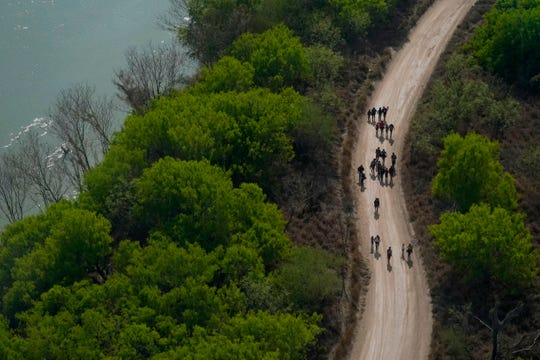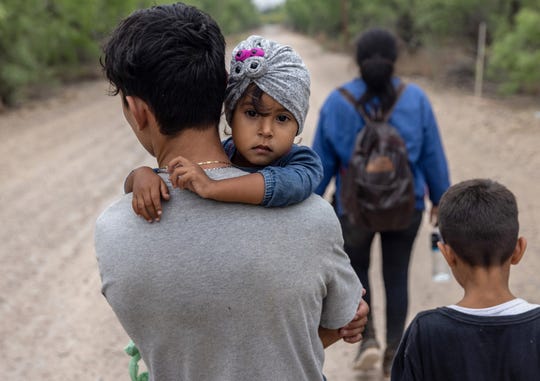
What would a better US immigration system look like? We asked the experts.
WASHINGTON — Immigration, one of the defining issues of the Donald Trump era, posed an immediate challenge to President Joe Biden on taking office.
His administration struggled to address a sizeable upswing in the number of migrants arriving at the US-Mexico border.
And processing delays have led to what some lawmakers, but notably not the White House, have called a growing “humanitarian crisis,” heightening political tensions in Washington.
Yet the situation at the southern border hasn’t brought about action on Capitol Hill, reflecting the decades-long gridlock on immigration among lawmakers who often have sharply divergent views on the nature of U.S. immigration.
“I think that the parties have been polarizing on immigration over the last 25 years,” said Ramesh Ponnuru, a visiting fellow at the conservative American Enterprise Institute and senior editor at National Review. “One important factor is just that the issue has become more important to partisan identities in a way that it wasn’t in the past,” Ponnuru added.
“When Bill Clinton was president and he had a commission that suggested a one-third reduction in legal immigration, it was not considered a bizarre thing for a Democrat to suggest such a thing,” he said, referencing a push by Democrats in the mid-1990s to crack down on legal and illegal immigration.
“Whereas now it is much more central to a progressive self-understanding that they are welcoming of immigrants and at least skeptical of punitive enforcement,” Ponnuru said.
Meanwhile, conservatives increasingly adopt a hardline stance on immigration enforcement that has grown in tandem over the same period, according to Ponnuru, a trend that accelerated during the Trump administration.
Migrants cross the U.S.-Mexican border into Mission, Texas, on March 23. (Photo: Julio Cortez, AP)
Many Republicans “believe the lesson to draw from the 1996 reform is that you cannot trust promises of enforcement, so other proposals that might seem attractive, like giving amnesty to people here and helping to prevent future illegal immigrants — you don’t go for that deal because you think you’ll get the amnesty part but not the enforcement part,” Ponnuru said.
The bitter history of reform efforts during each of the past presidential administrations has then left policymakers fiercely divided and often distrustful of each other on questions of immigration, including the role that immigration and immigrants should play in American life.
Potential policy solutions, though, are not in short supply. Scholars and officials from across the political spectrum have a number of ideas for reforming U.S. immigration, with varying degrees of bipartisan support.
USA TODAY surveyed a number of immigration experts for their potential reforms to the U.S. immigration system. Here are some of their responses:
‘A dream come true’: The life of an unaccompanied teen migrant, ten years later
Expanding legal immigration pathways
Increasing the number of legal avenues migrants are able to use to enter the U.S. is a position some analysts contend is not only a moral necessity but also a wise choice to reduce and streamline overall immigration.
Advocates point to the fact that the U.S. immigration system is often highly complex and punitive toward people only interested in coming for temporary periods or to complete certain jobs. The vast majority of people seeking entry into the country illegally are doing so for economic reasons; helping them find legal work disincentivizes them from staying illegally, analysts contend.
“It’s not only an administrative problem, it’s a problem with the fact that there is no legal way for these people to come,” said Alex Nowrasteh, director of immigration studies at the Cato Institute, a libertarian think tank.
Migrants are seen in custody at a U.S. Customs and Border Protection processing area under the Anzalduas International Bridge, Friday, March 19, 2021, in Mission, Texas. An increasing number of migrants on the Southwest border has the Biden administration on the defensive. The head of Homeland Security acknowledged the severity of the problem Tuesday but insisted it's under control and said he won't revive a Trump-era practice of immediately expelling teens and children. An official says U.S. authorities encountered nearly double the number children traveling alone across the Mexican border in one day this week than on an average day last month. (AP Photo/Julio Cortez) (Photo: Julio Cortez, AP)
Rep Henry Cuellar: One of Biden’s harshest critics on the migrant surge, urges White House to listen to border towns
Some visas, like those offered through the H-2A and H2-B programs, extend temporary legal status to migrants seeking economic opportunities in low-skilled work — agricultural work for the former category and labor like landscaping, tourism and forest conservation in the latter.
“These visas have an over 98% return rate because the workers know that if they return to Mexico legally they can come back in future years, and it’s just so much better to come legally. So even if a worker misses the system they’re more likely to wait,” Nowrasteh said.
“The problem is both of these are seasonal, so if you’re doing a year-round job in construction or retail then you’re not allowed to migrate here,” he said. Such programs are also dominated by Mexican workers, Nowrasteh noted, who are more likely to return to their home country after completing their contracts.
Mexico relations: ‘High-level chess’: How Biden is navigating his relationship with Mexico’s President ‘AMLO’
Over the past four years, temporary worker programs have increased, while opportunities for permanent residency have declined, a shift that was accelerated by the Trump administration during the coronavirus pandemic. The shift has allowed for greater economic opportunities for migrants while also increasing instances of corporate exploitation of migrant labor, according to the progressive Economic Policy Institute.
Ariel Ruiz Soto, a policy analyst for the nonpartisan Migration Policy Institute, said a key component in addressing the “stop and go migration flow” is creating a legal pathway visa system for migrants.
“The reason we recommend the legal pathway visa system is because it was a key component that actually reduced irregular migration from Mexico in the 2000s,” Ruiz Soto said. “As more people had the opportunities to come to the United States legally, the number of people who came in illegally reduced.”
The Biden administration’s plan to expand legal immigration would see a greatly increased number of temporary worker programs alongside a pathway to citizenship for the millions of undocumented people in the U.S.
Addressing causes of migration to stem flow
While increased legal immigration pathways into the United States may play a role in addressing the influx of migrants at the border, it would be only part of the solution. Immigration experts also cite the importance of recognizing the issues causing people to come to the U.S. in addressing the country’s immigration policy.
“I guess the overarching goal is that we should begin to think about what’s happened to the border by looking at what’s happening in the region first, and that includes looking at the conditions that are pushing folks to move from Guatemala, Honduras,” Ruiz Soto told USA TODAY.
“Looking specifically at what happened in those regions will be really important to understand what can be changed in the short term and in the long term,” he added.
Vice President Kamala Harris has been tasked with leading the White House effort to stem immigration amid the increase of unaccompanied migrant children at the U.S.-Mexico border, by establishing a partnership with Mexico and parts of Honduras, Guatemala and El Salvador.
Those numbers have grown this year. In March alone, 18,890 unaccompanied children from Central America arrived at the border, double the number of children in February.
Overall, U.S. Customs and Border Protection encountered more than 172,000 people trying to enter the U.S. along the southwest border in March – up from 71% from the previous month.
LA JOYA, TEXAS – APRIL 14: An immigrant child looks back towards Mexico after crossing the border into the United States with her family on April 14, 2021 in La Joya, Texas. Many Central American families who make the arduous journey describe their voyage as harrowing though the length of Mexico. Most pay large sums to smugglers, who often treat them, essentially, as cattle. Others fare even worse. They come nonetheless. (Photo by John Moore/Getty Images) (Photo: John Moore, Getty Images)
“While we are clear that people should not come to the border now, we also understand that we will enforce the law, and that we also, because we can chew gum and walk at the same time, must address the root causes that cause people to make the trek,” Harris said during a March meeting with Biden, Homeland Security Secretary Alejandro Mayorkas and Health and Human Services Secretary Xavier Becerra.
While the Biden administration seems to be echoing Ruiz Soto, he also shared that both expanding legal immigration pathways and addressing the root causes of migration are long-term solutions to a situation happening now.
“There needs to be a two-prong approach to increase the capacity and screening at the U.S.-Mexico border for people who are coming in, seeking asylum, as well as an understanding of what is happening and working with the authorities in Mexico in a way that’s more comprehensive to understand where migrants can come and how many are coming to Mexico as well.”
Bush weighs in: George W. Bush lobbies for bipartisan immigration reform in rare political statement
Enforcing immigration laws to increase deterrence
Conservative analysts are much more skeptical of arguments that increased avenues for immigration are the best approach to reducing illegal immigration in the long term.
“The U.S. is still a leader in the world in terms of offering one of the most generous immigration systems,” said Lora Ries, a fellow at the Heritage Foundation, a conservative think tank, who also served as acting deputy chief of staff in the Department of Homeland Security during the Trump administration.
“We need to focus on the legal immigration system to make it better and easier for people to apply and make it more difficult to come here illegally,” Ries said.
The country’s immigration system should be reformed, Ries argued, but only as part of an effort to reduce the number of exceptions for admission of undocumented immigrants.
Such reforms would include cracking down on cases of fraud in immigration courts, reducing avenues for migrants to enter the U.S. and increasing deportations of ineligible migrants, efforts which the Trump administration prioritized, sparking intense backlash among Democrats.
“We have a fundamental difference on enforcing the laws. A fundamental disagreement and unwillingness from this administration,” Ries said of her disagreements with the Biden administration’s approach to immigration.
“They have built a lot of this on the backs of children, unaccompanied alien children. It is why we are now seeing our third spike in unaccompanied children coming here, because the government keeps providing all these incentives for them to come…all sorts of benefits because they’re kids and then years later we say, ‘oh well we need to give them amnesty because they were kids when they came here.’ Well yeah because you invited them. It’s perverse,” she argued.
“If Congress knows these are the results, why won’t they change it, why won’t Secretary Mayorkas make it clear that unaccompanied children will be turned back. They are courting the inevitable. As long as you have such high levels of illegal immigration, why should you be trying to increase all the avenues?” she contended.
There were few potential laws circulating on Capitol Hill that Ries believes are worthwhile endeavors.
“I’d say, enforcement-wise, there are enough laws on the books. There needs to be the political will to enforce them and give law enforcement the tools to enforce them. If you are shutting down ICE (Immigration and Customs Enforcement) facilities then you are not allowing immigration enforcement to happen,” she continued.
Is cooperation possible?
The polarization surrounding the issue of immigration is unlikely to dissipate anytime soon, especially as Republicans continue to use the issue as a political cudgel against Biden.
Some advocates remain optimistic, however, that a consensus is possible — as long as the conversation continues at all.
“We wholeheartedly acknowledge that immigration is good, it’s been good and will continue to be good for our country. We’ve long been seen as a country that is a beacon of hope, of freedom, of a better life,” argued Kevin Fernandez, policy director at the LIBRE Initiative, a group that advocates for free-market principles in U.S. Hispanic communities.
“We also acknowledge that our immigration system is outdated and hasn’t been modernized in three decades, and a lot has changed since our immigration system was last updated,” Fernandez continued.
The kinds of major immigration reforms needed to meaningfully better the system haven’t been seen since the Immigration and Nationality Act of 1965, Fernandez argued.
That does not mean, though, that there aren’t policies out there to be put in place, Fernandez said. All immigration proposals should prioritize a “smoother, more humane, security-minded” approach to immigration, Fernandez said.
The LIBRE Initiative also endorses “providing more immigration judges to ensure that the backlogs are able to dealt with in a more efficient and humane manner,” a proposal that has widespread support among Democrats and tepid interest from some in the GOP.
In addition to Biden’s proposed immigration package, which has stalled as the administration shifts its attention to other priorities like infrastructure, Sens. Ron Johnson, R-Wisc., and Rand Paul, R-Ky., both have proposed reforms to the immigration system that may garner some interest across the aisle, Fernandez argued.
Johnson’s bill, originally introduced in 2017, would allow states a greater say in guest-worker programs by allowing them to issue non-immigrant visas at their own discretion. The policy would then let states diverge on the number of workers they’d like admitted to work in their states.
Paul’s proposal, which was recently jointly reintroduced with Sen. Richard Blumenthal, D-Conn., would reform the visa system to allow for 90 day visits by the relatives of American citizens abroad.
“Something that might seem a bit more of a trickier issue is the issue along the border right now,” Fernandez conceded. “Sen. (John) Cornyn and Sen. (Kyrsten) Sinema have issued a bipartisan border enforcement bill. It’s not a messaging bill, it doesn’t have poison pills but it does address the issue of lack of infrastructure and resources at the border for enforcement,” he said.
The most important factor in determining whether or not any future immigration reform is possible, Fernandez argued, is maintaining dialogue on these issues.
“I think it’s great that we have more people introducing more solutions – the worst plan is that we have only one plan out there from Democrats and one plan out there from Republicans and people are saying take your choice,” he said.
“If we don’t have those conversations and debates on solutions, it’s going to be the same old comprehensive immigration debate that we see every few years. So, I’m hopeful that we can get to a much better place.”
Follow Matthew Brown online @mrbrownsir.
Follow Sarah Elbeshbishi online @sarahbishi.
Source: Read Full Article


